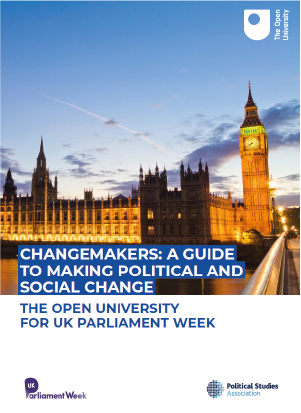Changemakers: a guide to making political and social change with Catherine McKinnell MP

As part of UK Parliament Week 2021, The Open University launched Changemakers: a guide to making political and social change in collaboration with UK Parliament and the Political Studies Association. As well as holding a public webinar to launch the guide, we also hosted an event for OU students studying or interested in politics to learn more about the project.
Dr Donna Smith (OU Senior Lecturer and Staff Tutor in Politics) chaired the webinar alongside Catherine McKinnell MP (Chair of the UK Parliament Petitions Committee and Member of Parliament for Newcastle Upon Tyne North), Annie Waddington (from UK Parliament Education and Engagement), and Lilybell Evergreen (OU Politics student).
The event discussed the contents of the Changemakers guide, including its step-by-step approach to making change and how small actions can lead to big change, the theme of UK Parliament Week 2021. This project was born from the ‘Open Politics’ initiative which asked people to think about someone who has inspired them through making change and share their changemaker with others, including on social media.
Overall, the Changemakers guide is divided into four steps. Firstly, Step 1 covers key tips to getting started making political and social change. For example, the importance of working out your aims; taking a focused approach means you can narrow down potential solutions and get others on board through clear communication. It’s important to identify who is the best person or group to approach, and whether there are existing initiatives you can join. Also, thinking about who else might also want to get involved is key and may influence the mode you choose to communicate in. You can read more tips, as well as all the details, in the guide.
Step 2 highlights the importance of finding inspiration from those who have already made change including some of the changemakers students and the public nominated during the ‘Open Politics’ campaign. It includes present and historical changemakers who have campaigned on a wide variety of issues, from Ian McKellen’s LGBT campaigning to Barbara Castle’s pioneering work for equal pay. Some have used their fame to raise awareness, which isn’t open to most of us, but some have also made change without existing platform. For example, Greta Thunberg is a great example of someone who has made change without an existing platform or fame. She also demonstrates how her small act of a solo strike outside the Swedish Parliament holding a sign reading ‘School Strike for Climate’, lead to a global movement. This section also covers some of the methods different changemakers have used to build awareness, as well as the difficulties they have faced. Making change isn’t always easy but finding a cause you are passionate about and inspiring yourself with other changemakers can help you to persevere!
Step 3 of the guide discusses ways you can affect change. This includes media activism, writing, and raising awareness in your local community. It also covers more traditional methods like voting, contacting your MP, creating a petition, and submitting evidence to a select committee. In the launch event, Catherine McKinnell MP spoke of how Parliament seemed inaccessible when she was growing up. She said she got involved in politics because she felt the need to change things that weren’t right. This began with student campaigns at university and is now something she enacts every day as a MP. She highlighted that contacting your MP is a powerful way of being heard and that they may raise your issue in Parliament. She ensures, as an MP, that she is rooted in her constituency and what her constituents in Newcastle North care about. Although debates in the House of Commons don’t always lead to the result you were looking for, she emphasises that an important aspect of a campaign is getting your issue heard and building momentum. As Chair of the UK Parliament Petitions Committee, she also believes petitions can plan an important role in gathering support and getting different issues heard.
Participants also had the valuable chance to ask Catherine some questions. One participant asked whether parliamentary debates were too focused on “he who shouts the loudest”. Catherine disagreed, emphasising that campaigns that bring many people together around an issue will make a difference. When asked who her own changemaker was, Catherine said she was inspired by Marcus Rashford’s campaigning for disadvantaged children experiencing food poverty. This included a petition as well as his own experiences as a child, something she believed made his argument very powerful. As a result of his campaign, he has improved millions of children’s lives in the UK.
The final step of the Changemakers guide is Step 4: spread the word! You can help others learn how to make political and social change by thinking of a changemaker who has inspired you. How have they made change? What can you and others learn from them? This can be someone who is widely known or someone like a friend or family member. Share your changemaker and the impact they have had on you, others, or society using the hashtags #UKPW and #OUatUKPW. You can also find out more and get involved with UK Parliament Week.

Thank you to the support of UK Parliament and the Political Studies Association in the creation of the guide. Additionally, we are grateful to Annie Waddington for her contribution and Catherine McKinnell MP for providing an inspiring insight into the work of an MP and the Petitions Committee, as well as answering all of our questions.
Finally, don’t forget to check out Changemakers: a guide to making political and social change to learn more and get started making change!
Request your prospectus
![]()
Explore our qualifications and courses by requesting one of our prospectuses today.
